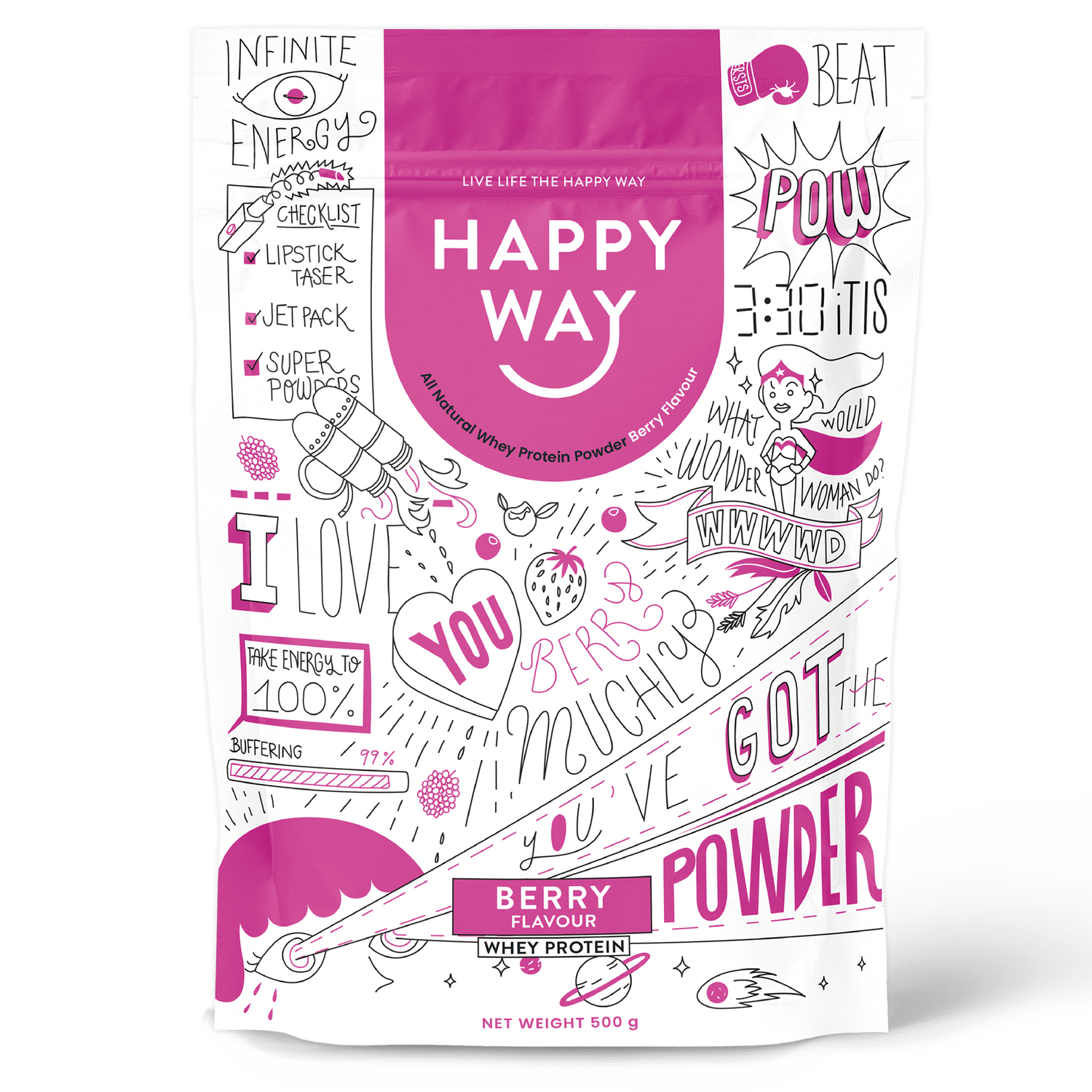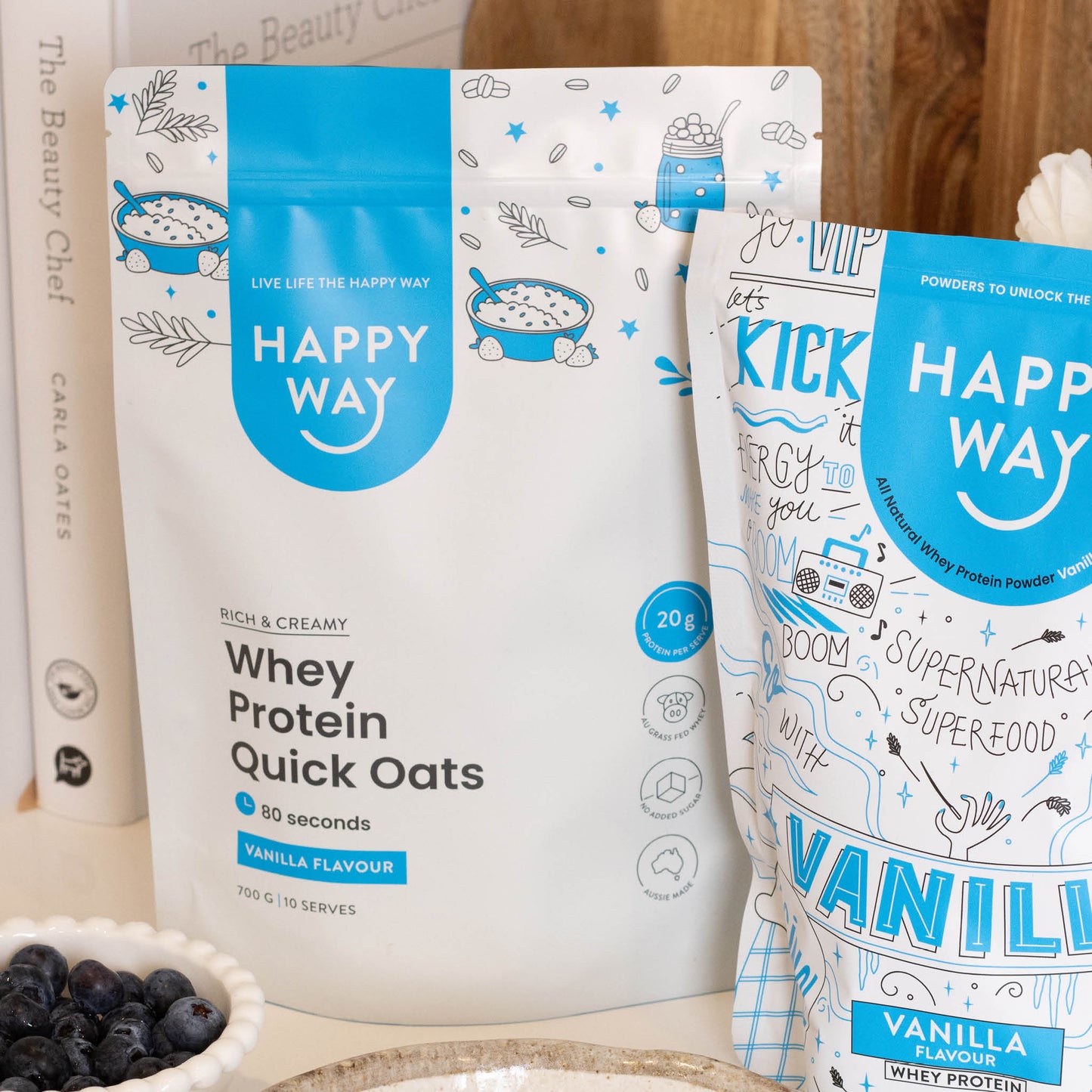You’ve likely heard the buzz around medications like Ozempic and Wegovy (also known as GLP-1 receptor agonists) whether in the news or from someone you know. While these medications have been making headlines for their increasing popularity in weight loss management, they’re just one piece of a much bigger picture.
These medications can be an effective tool for certain health conditions but sustainable weight management involves many factors beyond medication such as adopting healthy habits, lifestyle, and supporting your body with the right fuel.
That's why we asked certified nutritionist, Heidi Dillion to help us explore what GLP-1 drugs for weight loss are, how they work, and most importantly, how to lose weight sustainably with the help of Happy Way.
WHAT IS OZEMPIC/ GLP-1?

Medications like Ozempic and Wegovy have gained a lot of attention for their role in supporting weight loss.
Originally developed for people with type 2 diabetes, these medications mimic a natural hormone in the body called GLP-1 (glucagon-like peptide-1). This hormone helps:
- Slow digestion so you feel fuller for longer
- Reduce appetite and cravings by signalling the brain
-
Support blood sugar regulation by increasing insulin release
WHY IS OZEMPIC POPULAR FOR WEIGHT LOSS?
Ozempic has become such a big talking point, with many people exploring it as an option for weight management. While it may help reduce cravings, it doesn’t always address the bigger picture of creating long-term, sustainable habits.
The recent conversations around Ozempic highlight an important reminder: lasting results usually come from a combination of balanced nutrition, movement, sleep, and overall lifestyle support, not just one solution on its own.
WHAT TO KNOW IF YOU'RE USING GLP-1 DRUGS FOR WEIGHT LOSS:
Being on a GLP-1 receptor medication may lead to weight loss because it reduces appetite. But that reduced appetite can also mean you’re eating less overall which makes what you eat even more important.
It’s essential to focus on:
- Getting enough protein to maintain muscle mass, support metabolism, and keep you full.
- Eating the rainbow with a variety of fruits, vegetables, nuts, seeds, legumes, and whole grains to provide fibre and nutrients that support gut health and digestion.
- This ensures you’re not just eating less, but eating well, so your body gets what it needs for energy, recovery, and long-term health.
IS OZEMPIC SAFE FOR WEIGHT LOSS?
Ozempic has become a popular option for weight management, and while many people do experience results, it’s important to be aware of the potential side effects. Some reported experiences include nausea, vomiting, fatigue, and changes in digestion, which can sometimes make it harder to maintain a balanced diet.
What’s still uncertain are the long-term effects, especially for those using it purely for weight loss. Another consideration is sustainability - when habits around nutrition, movement, and sleep aren’t supported alongside medication, weight can often return once treatment stops.
For long-lasting results, building a foundation of balanced nutrition, quality sleep, hydration, and regular movement is key. Exploring natural, nutrient-dense foods, lifestyle shifts, or supportive supplements (like Happy Way) can empower you to achieve sustainable weight loss while improving your overall health.
LOOKING BEYOND THE NUMBER ON THE SCALE:

In my clinic, weight loss is rarely the only goal. Many women I work with also want support with:
- Managing high blood sugar levels or early insulin resistance
- Improving cholesterol or triglyceride levels
- Addressing hormonal changes from perimenopause or menopause
- Supporting gut health and digestion
That’s because health is about how the body functions as a whole, not just body weight.
THE BIGGER PICTURE: WHAT INFLUENCES WEIGHT AND HEALTH
Lasting weight management involves looking at more than just calories or food choices.
I help clients explore factors such as:
- Sleep: Poor sleep can affect appetite hormones, leading to increased cravings the next day.
- Gut health: The gut microbiome influences digestion, metabolism, and even appetite regulation.
- Insulin sensitivity: How your body processes and stores carbohydrates can impact energy levels and fat storage.
- Movement: Physical activity supports muscle health, energy, and metabolic function.
- Hormones: Thyroid and reproductive hormones can affect metabolism and overall wellbeing.
This is why a holistic approach matters. It looks at the whole picture, not just one piece of the puzzle.

WHAT TO ADD TO SUPPORT SUSTAINABLE WEIGHT LOSS
One of the most effective mindset shifts for sustainable weight loss is to focus on what to include in your diet, rather than what to cut out.
When you prioritise nutrient-dense foods that support gut health, blood sugar balance, and satiety, you’re more likely to feel satisfied and energised and weight loss can become a natural side effect of those healthy habits.
Some simple ways to start include:
- Include a source of protein at each meal to support fullness and reduce sugar crashes.
- 4–5 cups of low-GI vegetables across the day like leafy greens, broccoli, zucchini, and cauliflower for fibre and micronutrients. If this sounds like a lot, start lower and slowly work up to this.
- Choosing high-fibre foods to support digestion and gut health such as nuts, seeds, legumes, quinoa.
- Stay well hydrated – dehydration can leave you feeling fatigued, foggy, and more likely to reach for sugary snacks for quick energy. Aim for 2–3 litres of water across the day, and if you’re exercising, in a hot climate, or sweating a lot, consider Happy Way Electrolytes to support fluid balance.
- Batch cook meals to reduce ultra-processed food and takeaway consumption, which are often higher in calories and lower in nutrients.

PRACTICAL WAYS TO SUPPORT THESE HABITS:
Nutrition doesn’t have to be complicated. Some simple, practical ideas include:
- Happy Way Protein Oats topped with Greek yoghurt, a ¼ cup of nuts for fibre, and fresh fruit.
- Morning breakfast smoothies with Happy Way Protein Powder for a quick, nutrient dense breakfast or afternoon snack.
- A warm drink after dinner using Happy Way Sleep Tight blend if you enjoy a sweet treat before bed without the excess sugar.
- Add a side salad or steamed greens to your lunch or dinner. Meals like ham and cheese toasties or pasta are often low in fibre, which can impact energy levels across the day.
- Include a protein and fibre snack between meals if you’re hungry. Options like veggie sticks with hummus, seeded crackers with cottage cheese, or a light snack shake made with protein powder, frozen berries, and your choice of milk.
These ideas help balance blood sugar levels, improve satiety, and reduce reliance on ultra-processed foods for quick energy boosts.

THE TAKEAWAY:
Medications like GLP-1 receptor agonists have a place in managing certain health conditions, but they’re not the only approach to weight loss.
By focusing on behavioural habits, nutrient-rich foods, hydration, sleep, movement, gut health, and hormonal balance, you can create lasting changes that go beyond weight loss alone, helping you feel better, have more energy, and support your overall health.
With the right strategies and practical tools like Happy Way supplements, building these habits can be simple and sustainable.
Heidi x
This information is general in nature and does not replace individualised advice. Always seek guidance from a qualified health professional for your specific needs. This article does not make therapeutic claims and is intended for educational purposes only.
FAQs
What are the common side effects with Ozempic?
Some people experience side effects such as nausea, digestive issues, or difficulty maintaining balanced nutrition due to reduced appetite. These Ozempic issues highlight why focusing on nutrient-dense foods, protein intake, and hydration is so important.
Is Ozempic weight loss sustainable long-term?
Although Ozempic may support short-term weight loss, the results often depend on whether you’ve built sustainable lifestyle habits. True, lasting weight management comes from improving sleep, gut health, hormones, and nutrition, not just relying on medication.
What’s going on with the Ozempic controversy?
The Ozempic controversy comes from rising demand, shortages, and concerns over long-term health risks of Ozempic. While the science behind Ozempic isn’t wrong, it’s only one tool. A holistic, sustainable weight loss approach helps reduce reliance on medication alone.
What are the health risks of Ozempic?
Possible health risks of Ozempic include gastrointestinal problems, low blood sugar (in some cases), and unknown long-term effects. These Ozempic problems show why it’s best used under medical supervision, alongside holistic strategies for sustainable weight loss.
What are some alternatives to Ozempic for weight loss?
There are Ozempic alternatives such as other GLP-1 drugs for weight loss, but also natural, holistic approaches. Focusing on protein-rich meals, balanced nutrition, hydration, movement, and support from products like Happy Way Protein or Electrolytes can be effective alternatives.
How can I lose weight sustainably without Ozempic?
If you’re wondering how to lose weight fast naturally and permanently, the answer lies in sustainable changes. This includes prioritising whole foods, protein at each meal, 4–5 cups of vegetables daily, staying hydrated, moving regularly, and using Happy Way supplements to make it easier.











